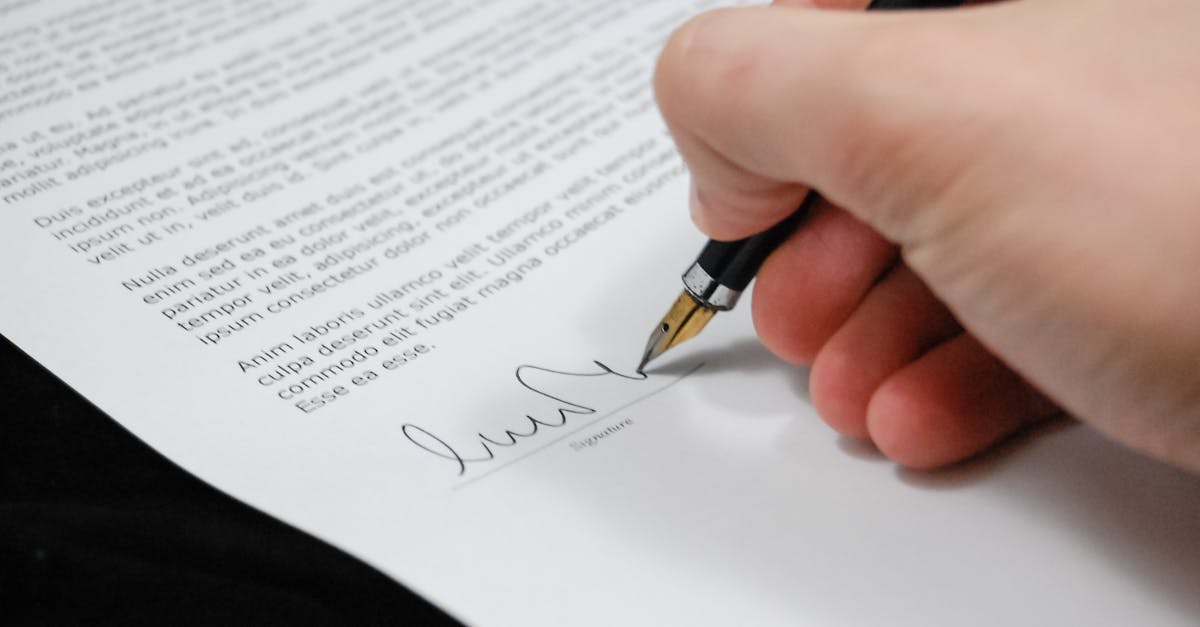
Alternatives to Drafting Legal Documents Independently
If the thought of drafting legal documents independently seems daunting or risky, there are alternative options available to individuals seeking legal paperwork. Employing the services of an attorney is a common approach when facing complex legal matters. Attorneys possess the knowledge and expertise to ensure that legal documents are accurately drafted and in compliance with the relevant laws and regulations. They can also provide valuable legal advice and guidance throughout the process, helping individuals navigate any potential challenges that may arise.
Another alternative to drafting legal documents independently is utilizing online legal document services. Various online platforms offer templates and tools that allow individuals to create their own legal documents in a simplified and user-friendly manner. While these services can be cost-effective and convenient, it is essential to exercise caution and ensure that the documents are tailored to meet the specific needs and requirements of the individual's situation. Consulting with a legal professional to review the documents can provide an added layer of assurance and help avoid any potential pitfalls that could arise from inaccuracies or omissions in the drafting process.
Online Legal Document Services
Online legal document services offer a convenient and cost-effective way for individuals to create their own legal documents without the need to hire a lawyer. These services typically provide templates for a wide range of legal documents, such as wills, contracts, and power of attorney forms. Users can simply fill in the necessary information and customize the document to suit their specific needs. While these services can be a helpful resource for those looking to save time and money, it is important to exercise caution when using them.
One of the key benefits of utilizing online legal document services is the accessibility they offer. Users can access these services from the comfort of their own homes and complete the document at their own pace. Additionally, many online platforms provide guidance and support throughout the drafting process, helping users understand the legal language and requirements involved. However, it is crucial to remember that these services are not a substitute for professional legal advice. Drafting legal documents, even with the help of online services, still requires careful attention to detail and an understanding of the legal implications involved.
Factors to Consider When Deciding Whether to Draft Legal Documents Yourself
Factors to consider when deciding whether to draft legal documents yourself include the complexity of the document. Legal documents can vary widely in complexity, from simple agreements to intricate contracts with multiple terms and conditions. Assessing the intricacy of the document you intend to draft is crucial in determining whether it is within your capabilities to tackle alone. Ambiguity or lack of clarity within legal documents can lead to disputes and potential legal consequences down the line, making it essential to thoroughly evaluate the complexity of the task at hand before proceeding with DIY drafting.
Another important factor to ponder when contemplating drafting legal documents without professional assistance is the potential consequences of errors in the self-drafted documents. Mistakes in legal documents can have serious implications, ranging from minor inconveniences to severe legal consequences such as invalidation of the entire document. Understanding the gravity of inaccuracies or oversights in legal documentation is essential in making an informed decision about whether to proceed with drafting independently. Diligence in reviewing and ensuring the accuracy of the drafted content is paramount to avoid pitfalls that may arise from errors in the document.
Complexity of the Document
When considering the complexity of a legal document that you intend to draft on your own, it is crucial to assess the intricacies of the language used, the specific legal terminology required, and the overall structure of the document. Legal documents often involve technical language and precise wording to ensure that the intended meaning is clear and legally valid. Moreover, the format and organization of legal documents play a vital role in their effectiveness, requiring attention to detail and adherence to legal standards.
Drafting legal documents demands a comprehensive understanding of the laws and regulations that govern the subject matter at hand. Failing to grasp the nuances of these laws can result in critical errors or omissions in the document, which may render it ineffective or unenforceable in legal proceedings. Therefore, it is essential to carefully evaluate whether your knowledge and expertise align with the complexity of the document you plan to draft independently.
Potential Consequences of Errors in SelfDrafted Legal Documents
Potential Consequences of Errors in Self-Drafted Legal Documents. When individuals attempt to draft legal documents without professional guidance, they may inadvertently omit crucial information or use improper legal language, leading to ambiguity or misinterpretation. These errors can result in legal disputes, delays in processing, or even the invalidation of the document in question. Without the expertise of a legal professional, individuals may overlook essential clauses or legal requirements that are necessary for the document to hold up in court.
Moreover, self-drafted legal documents that contain errors or inconsistencies can have long-term repercussions on individuals and businesses. Inaccurate legal documents may not only fail to achieve the intended outcome but can also result in financial losses, legal liabilities, or the need for costly legal corrections in the future. The ramifications of errors in drafting legal documents can extend far beyond the initial drafting stage, impacting various aspects of personal and professional life.
Invalidation of the Document
Invalidation of the Document
Drafting legal documents without the proper knowledge and expertise can lead to serious consequences, one of them being the potential invalidation of the document. In legal matters, precision and accuracy are paramount, and any errors or omissions in a self-drafted document could render it null and void. This means that all the time and effort put into creating the document would essentially be wasted if it is deemed invalid by a court or relevant authority.
Moreover, an invalidated document may not serve its intended purpose, leaving parties involved in a legal dispute or transaction exposed and vulnerable. When a document is found to be invalid due to mistakes in drafting, it can prolong legal proceedings, lead to costly litigation, and even jeopardize the rights and interests of those involved. Therefore, it is crucial to carefully assess the risks and implications of drafting legal documents without the guidance of a qualified professional to avoid the potential of having the document invalidated.
FAQS
Can I draft my own legal documents without any legal background?
Yes, you can draft your own legal documents without a legal background, but it is recommended to seek advice from a legal professional to ensure accuracy and legality.
Are online legal document services a reliable option for drafting legal documents?
Online legal document services can be a convenient option for drafting legal documents, but it is important to carefully review the documents and consider consulting with a lawyer to address any specific legal concerns.
What factors should I consider before deciding whether to draft legal documents myself?
Factors to consider before drafting legal documents yourself include the complexity of the document, the potential consequences of errors, and the importance of ensuring the document is legally valid and enforceable.
What are the potential consequences of errors in self-drafted legal documents?
Errors in self-drafted legal documents can lead to invalidation of the document, disputes, and potential legal consequences. It is crucial to ensure accuracy and compliance with legal requirements.
How can errors in self-drafted legal documents lead to the invalidation of the document?
Errors in self-drafted legal documents, such as missing critical clauses or using incorrect legal terminology, can lead to ambiguity or unenforceability, resulting in the document being invalidated by a court. It is advisable to seek legal guidance to avoid such pitfalls.
